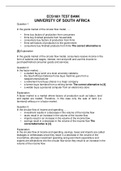ECS1601 TEST BANK
UNIVERSTY OF SOUTH AFRICA
Question 1
In the goods market of the circular flow model, ….
• firms buy factors of production from consumers
• firms buy finished products from households
• consumers buy factors of production from firms
• firms sell factors of production to the government
• consumers buy finished products from firms The correct alternative is
[5].Explanation
In the goods market of the circular flow model, consumers receive income in the
form of salaries and wages, interest, rent and profit and use this income to
purchasefinished consumer goods and services.
Question 2
In the factor market, … .
• a student buys lunch at a local university cafeteria.
• the South African Defence Force buys machine guns from a
weapons manufacturer
• a retirement fund buys shares in a major company
• a farmer buys farmland from a retiring farmer The correct alternative is [4].
• a welder buys a personal computer from an electronics store
Explanation
A factor market is a market where factors of production such as labour, land
and capital are traded. Therefore, in this case only the sale of land (i.e.
farmland) willoccur in a factor market.
Question 3
In the circular flow of income and spending, … .
• investment results in a decrease in the volume of the income flow
• taxes result in an increase in the volume of the income flow
• imports result in an increase in the volume of the income flow
• savings result in a decrease in the volume of the income flow The
correct alternative is [4].
Explanation
In the circular flow of income and spending, savings, taxes and imports are called
leakages or withdrawals since they result in a decrease in the volume of the
incomeflow, whereas investment spending and government expenditure and
exports are allinjections into the circular flow since they result to an increase in the
volume of the income flow.
, 1
Question 4
Which one of the following statements is correct?
• Flows (2) and (3) represent income.
• Flows (2) and (4) represent spending.
• Flows (1) and (2) represent spending.
• Flows (1) and (3) represent spending. The correct alternative is [4].
Explanation
In the circular flow of income and spending, households supply factors of
production to firms and in turn receive income which they spend on goods and
services offeredby firms (Flow 3). Their spending represents the income to firms.
Firms spend some of their income to pay wages to households for their services,
interest for the use of capital and rent for the use of their land (Flow 1).
Question 5
• capital, wealth and income are stock variables, whereas investment and
profitare flow variables
• capital, wealth and gold reserves are stock variables, whereas
investment, profit and loss are flow variables The correct alternative is
[2].
, • investment, income and profit are stock variables, whereas capital, wealth
andnatural resources are flow variables
• capital, wealth and population size are stock variables, as are
investment, profit and savings
Explanation
Capital, wealth and gold reserves are stock variables since they have no time
dimension and can only be measured at a specific moment. Whereas
investment, profit and loss are flows since they have a time dimension and can
only be measured over a period.
2
Question 6
In the circular flow of income and spending, the main leakages are:
• the foreign sector, the financial sector and taxes
• imports, investments, bank withdrawals, off-shore shares and securities
• imports, savings and taxes
• a
• c The correct alternative is [2].
• a and b
• b and c
• None of the above.
Explanation
Savings, taxes and imports are leakages in the circular flow of income.
Question 7
In a mixed economy, the economic decisions of what to produce, how to produce
it,and who will receive it are made by … .
• the government
• consumers and firms
• banks and stock markets
• household, firms, government and the foreign sector The correct
alternative is [4].
• banks and the government
Explanation
, In a mixed economy the households, firms, government and the foreign sector all
participate in the production process. They all partake in production, income and
spending since they contribute towards production, earn an income and spend
theirincome.
Question 8
An example of a double coincidence of wants is … .
• a car dealer who wants a TV finding an electronics store owner who
wants money
• a car mechanic who wants a TV finding an electronics store owner who
wantsa car repaired The correct alternative is [2].
• an electronics store owner who wants car repairs finding a car mechanic
whowants money
• All of the above.
Explanation
A double coincidence of wants is present where two individuals have exactly the
same products available for exchange that the other person wants. In this case a
car mechanic who needs a TV finds an electronic store owner who needs a car
repaired.
Question 9
Money overcomes the problem of a double coincidence of wants through its
functionas a …
• medium of exchange The correct alternative is [1].
3
• unit of account
• standard of deferred payment
• store of
valueExplanation
Money overcomes the problem of double coincidence of wants through its
functionas a medium of exchange – it lubricates the process of exchange.
Question 10
The demand for money curve is … because a lower interest rate ... .
• upward-sloping; increases the opportunity cost of holding money
• downward-sloping; increases the opportunity cost of holding money
• upward-sloping; decreases the opportunity cost of holding money




